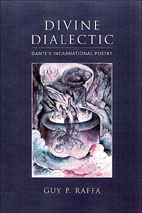Divine Dialectic: Dante’s Incarnational Poetry (University of Toronto Press, 2000)
Divine Dialectic: Dante’s Incarnational Poetry offers a fresh reading of Dante’s major literary works—the Vita nuova and the Divine Comedy—by combining central tenets of incarnational theology and dialectical thought. Recognizing Dante as a poet who paradoxically embraces both opposition and reciprocity, this book shows how Dante challenges such conventional dichotomies as human desire and divine love, artistic fame and spiritual humility, sacrifice and triumph, and political action and philosophical contemplation. Divine Dialectic argues that Dante crosses textual and theological boundaries to promote the paradoxical union of contradiction and resolution as a way of reading his poem and, by extension, the world itself.
Reviews
This book is commendable for being daring and Dantean in the truest sense of the word. – Renaissance Quarterly
Lucid, erudite, and thought provoking, this is an important contribution to Dante studies that will be obligatory reading for advanced students and scholars of the Commedia. – Choice
This is a book, though, not just for Dante Scholars. Anyone interested in medieval Christianity will find it informative and enriching. – Christianity and Literature
This impressive book, Guy Raffa’s first, shows from the outset a genuinely remarkable degree of scope and ambition. . . . This is an important contribution to the field that will compel its readers to reconsider some of their most cherished preconceptions about the workings of Dante’s mind and poetry. . . . He leaves his readers permanently indebted to him, both for a compelling general interpretation of Dante’s major works and for countless illuminating observations of textual detail that enlarge our readerly understanding. – Symposium
The reviewer read every page of this book with keen interest and found it to be one of the most satisfying works of criticism on Dante that he knows. . . . It achieves a remarkable level of readability and grace, comprehensiveness and control, telescoping whole fields of scholarship in ways that focus their exact pertinence for specific points in Dante’s text. It deserves to become a widely read and highly esteemed work of American Dante criticism. – Letteratura Italiana Antica

